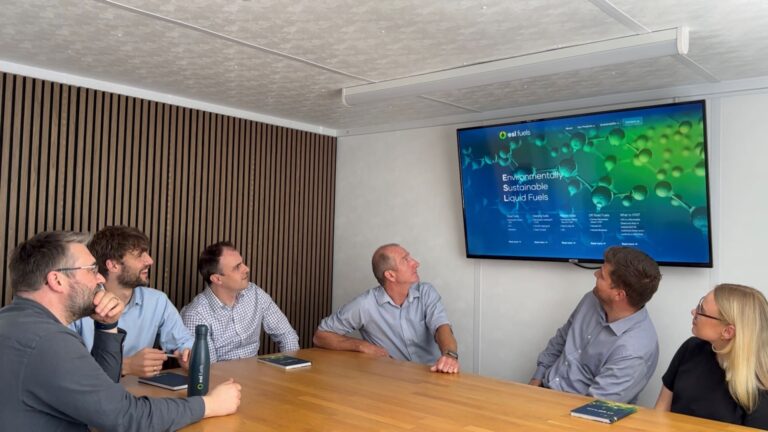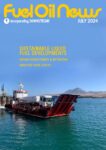
Over the past twenty years, the company has supplied over two billion litres of fuel to the UK market and offers nationwide coverage through its relationship as a supplier to the nation’s leading distributors, with supply points at Immingham, Ellesmere Port, Dagenham and Grangemouth.
Continually investing in research and development, ESL fuels has a highly technical team who work closely with the industry to support and develop fuels best suited to end applications.
From the early days of pioneering biodiesel, to creating market-changing heating and marine gas oils, ESL has consistently led innovation in the industry. In recent times, they have expanded to produce a range of renewable liquid fuels, demonstrating their ability to adapt and evolve.
Margaret major, Publishing Director for Fuel Oil News, spoke with Richard Donovan, General Manager, and Andrew Walkden, Commercial Manager, to delve into the history of this forward-thinking industry supplier and to discuss the capabilities that enables ESL to continually pivot to meet future fuel demands.
For many, sustainable liquid fuels have emerged over recent years yet you have been producing them for around 25 years – what originally drove this?
Andy: Our story started in the 1990s when owner Stephen Whittaker was researching and testing the viability of processing used cooking oil (UCO) and blending it into diesel. At that time, UCO was a waste in every sense and producers would pay for its collection and disposal, presenting an opportunity to produce a fuel at a lower cost per litre.
Steve bought a trailer and would drive round local restaurants, then take it back to his barn to process. In parallel with the work to make it physically possible, a significant amount of government lobbying and HMRC consulting was also required.
Ultimately, this proved successful and, in 2000, the company was incorporated and we became the first UK-based entity to sell biodiesel commercially.
What was the company’s journey from that early success to the present day?
Andy: Following the early success mentioned above, the oil majors also began to produce biodiesel and it was evident that ESL Fuels would be unable to compete with their economies of scale. In anticipation of this, Steve had continued innovating and, in 2005, he developed and launched Greenflame renewable heating oil, shortly followed by the launch of Ultra 35, a gas oil alternative for boilers. It was the fossil version that proved to be the bigger success at that time and this led to a period of sustained growth.
In 2012, the company bought the mothballed BP Castrol terminal at Stanlow, a facility with over 100 tanks, and we undertook a major renovation program to bring it back into service. Amongst various projects at the site was the trialling of processing of a range of wastes, providing many learnings that would prove useful in later years.
In 2013, we developed and introduced a marine gas oil grade with a maximum density of 860, that enabled us to enter a new market and establish new relationships.
In 2016, we sold Stanlow Oil Terminal to Argent Energy, a move that allowed us to increase our focus on product development and move production of our main grades to a more logical hub at Immingham. Our offices moved to Thornton Science Park, part of Chester University, and we commenced a program of investment building up our laboratory.
Two years later, we expanded our production capabilities by commencing operations at Dagenham. We also broke ground on a new site at Ellesmere Port, where the focus was on developing new technologies to process waste and residual feedstocks.
By 2021, we were ready to launch a range of renewable fuels, returning us to the company’s roots. We achieved ISCC certification for handling sustainable material and gained approval under the Renewable Fuels Assurance Scheme (RFAS). We now offer a variety of sustainable solutions to the road, heating and marine markets, and these are either produced at our Ellesmere Port site or imported to Immingham. This year we expect 40% of our sales to be renewable fuels.
With your drive for sustainable solutions, tell us about your company values.
Richard: Our values are emblazoned across the walls of our main office, ensuring we remember and live by them.
Innovate: we encourage creative thinking and continuously strive for improvement in everything we do.
Nurture relationships: building strong, mutually beneficial partnerships across our business. This applies to suppliers as well as customers.
Be the best: we are committed to delivering the highest quality, value, and service. Excellence is our standard.
Act with integrity: integrity is paramount in all aspects of our operations. We build this into every decision and action we take.
Who are the ESL team that deliver these?
Andy: We currently have 27 employees, half of which are office based with the other half operating our Ellesmere Port site. We’ll focus here on the members of the team most likely to interact with the industry.
Stephen Whittaker continues to drive innovation in products and technology, and can usually be found in our laboratory or on the plant developing his latest ideas.
Richard Donovan runs the business at a strategic and tactical level and has been General Manager for eight years now. His achievements were recently recognised by being awarded Commercial Finance Director of the Year, following a nomination from HSBC.
I am the Commercial Manager and the longest serving employee of ESL Fuels. I work closely with distributors to identify and supply the most appropriate product for the end application.
Working alongside me to look after our customers, and with deep understanding of the markets, are Chris Dolphin and Charlie Simpson.
David Hinsley oversees all things operational, supported by Ellie Molloy on supply and Col Ellison on transport. With their flexible and creative approach there’s rarely a challenge that this team can’t solve.
Colin Dixon is Head of Business Development and is always seeking new opportunities in a role that spans supply and sales. He’ll soon be handing over the reins to a new recruit who will continue his good work.
James Ashton recently joined us as Financial Controller and suppliers and customers will be familiar with his team – Becky Bate, Dev Seth and Liz Dodd.
What are your main products?
Andy: Ultra 35 is, historically, our biggest selling product. It is a drop in replacement for gas oil / diesel boilers, providing a tailored specification with facets such as improved lubricity, at a favourable price to standard grade. This is complemented by other heating products such as Openflame and Openflame Lite which offer even more economical alternatives; those particular two being for open furnace applications.
GreenFlame D100 is a renewable alternative – it is also compatible with all gas oil/ diesel boilers and, being produced from ISCC certified sustainable feedstocks, it delivers up to 90% GHG savings.
GreenFlame is currently a unique market proposition and we are enormously proud of having developed this over the past few years.
It is produced using proprietary technology and from a variety of feedstocks.
Renewable diesel / HVO is a paraffinic diesel that is now well known in the market. Where it is sold for an obligated use, we supply it under RFAS, with respect to which we are now the longest-approved supplier for this product. It is FAME free, reduces particulate matter and nitrogen oxide (NOx), is virtually sulphur and aromatic free, has excellent cold weather performance, a high flashpoint and also delivers up to 90% GHG savings.
We supply distributors and traders / brokers with a marine gas oil that has a maximum density of 860 and offers improved lubricity and excellent cold flow properties.
More recently, the marine sector has also stepped up its interest in renewable fuels and we have developed a range of products to meet a variety of specification and sustainability requirements. More information is available on our website!
Alongside your fuel range, what other services do you offer?
Andy: We offer technical support to assist distributors in identifying the ideal fuel for end customer applications, and are often asked to correspond directly with them to provide technical know-how and the reassurance that can be required when switching fuels.
We are also pleased to work with UKIFDA, the vital trade association for the liquid fuel distribution industry and other industry bodies.
“ESL Fuels, an associate member, provides invaluable technical advice and support to UKIFDA” – Ken Cronin, CEO UKIFDA.
“ESL Fuels have provided valuable technical advice and support to our members on fuel oils and sustainable liquid fuels”, David Kilpatrick (Director, The Combustion Engineering Association).
Another popular service is our offering of fixed prices and premiums, which can be back-to-backed with end customers. Many companies want to fix their fuel prices during their budgeting process, valuing the certainty that it brings. We manage the hedge positions and can generally offer a variety of options.
Given the nature of our business, we naturally have an extremely well-equipped laboratory that has seen an investment in the region of £1 million the past few years. Although it is primarily used in-house, we do also offer its services to our customers.
The laboratory is clearly a vital part of your business. What is it used for?
Richard: Routine activities are the testing of incoming components, monitoring processing and testing the finished product. Then there is also research and development which naturally comes in peaks and troughs.
Our site at Ellesmere Port receives a variety of biogenic, waste and residue feedstocks, which can vary greatly in their qualities.
It is critical that we assess each load to determine whether it meets specification and is acceptable, then decide what processing it requires, recommend what it should, or can be, blended with and, ultimately, plan how to best use it in the production of finished products. Testing is just as rigorous when in tank and at the duty point, ensuring tight quality control throughout.
Research and development in the laboratory can relate to both technology and products. Ideas scale up to pilot plants, before being fully commissioned on-site. We also have three test boilers, which are used for trialling different products and technology.
Looking to the future what is the vision? Richard: Our vision is ‘to be and remain the most innovative and technically capable company in environmentally sustainable liquid fuels’. We will continue to work closely with our customers and suppliers, reinvesting our profits in focused research and development, and scaling our production and supply in sync with market growth.
Perhaps most importantly, we’ll remain agile, to ensure we can react quickly as new opportunities and threats emerge.
Image credit: ESL Fuels
